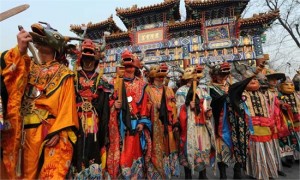Update: I want to take back a part of this post. I wrote the Nazi comparison in great haste, and I probably shouldn’t have, because Nazi is such a super-charged word. Anyone reading the text will see I am not saying Chinese people are like Nazis, and actually say the opposite: “Let me add, however, that while most gullible Germans ate this up, I strongly believe most Chinese are going to reject the race baiting that is setting the Internets ablaze today.” The Chinese will react responsibly and not like Nazis. What I thought was comparable was the use of race-baiting terms like “foreign trash” and sstereotyping many foreigners as spies, law breakers and enemies of China. Racial stereotyping was what I was alluding to. But in retrospect, I should have avoided that term and should have know that its use would be misunderstood by many.
Scapegoats are marvelous tools for energizing the masses. Especially when they are based on race. Der Stuermer, an Nazi rag published by Julius Streicher, often depicted images of grotesquely stereotyped Jews (big noses, fiendish) molesting pure, young beautiful German maidens. It was a successful campaign. Many really believed this was what Jews were, what they did. And it was a conspiracy, designed to pollute German blood and tear down German greatness. Let me add, however, that while most gullible Germans ate this up, I strongly believe most Chinese are going to reject the race baiting that is setting the Internets ablaze today. They are too suspicious of their government at the moment and are getting good at seeing through the government’s propaganda.
Although comparisons with Nazis are used too frequently and can induce groans, it’s nevertheless the first thing I thought of as I read the appalling call by Yang Rui, host of CCTV 9’s popular show Dialogue, calling in violent language for the ouster of “foreign thugs” from China’s sacred soil. This was brought on by two disgusting incidents of foreigners acting like idiots, even rapists, one attempting to molest a Chinese woman, another treating a Chinese woman on a train like scum. Shameful. Sickening. As vile as a crime can be. But these two sorry incidents are being used as red meat by the likes of Yang to rally the masses and breed hatred of all foreigners, even if Yang doesn’t say that in so many words. In his words:
The Public Security Bureau wants to clean out the foreign trash: To arrest foreign thugs and protect innocent girls, they need to concentrate on the disaster zones in [student district] Wudaokou and [drinking district] Sanlitun. Cut off the foreign snake heads. People who can’t find jobs in the U.S. and Europe come to China to grab our money, engage in human trafficking and spread deceitful lies to encourage emigration. Foreign spies seek out Chinese girls to mask their espionage and pretend to be tourists while compiling maps and GPS data for Japan, Korea and the West. We kicked out that foreign bitch and closed Al-Jazeera’s Beijing bureau. We should shut up those who demonize China and send them packing.”
[Note: I am having serious problems with the GFW and my VPN is making it hellish for me to supply links. This is from the Shanghaiist.]
Just last week friends began warning me to carry my passport at all times, as the PSB was stopping foreigners randomly, especially around Western hangouts like Sanlitun, to make sure they hadn’t overstayed their visa. Papers please. This all smells like a concerted campaign.
China Geeks has some excellent analysis and translations of weibo users’ reactions to this nonsense, and makes a strong argument that all foreigners should boycott Dialogue. I have at least four friends who have appeared on the program, and I really think they need to reconsider. After you read Charlie’s post you’ll have to agree. [Again, sorry but I can’t link.]
An interesting moment to be in China. Something seems to be in the air, an extreme edginess brought on by doubts about the government and concern for China’s future. I’ve never heard so many Chinese people tell me they oppose their government, even hate it. Obviously that’s not scientific, but my expat friends agree. China almost seems on the brink, unable to control its dialogue (no pun intended) and floundering in the wake of recent embarrassments we all know about. Rifts and fissures are becoming more apparent, and there’s a sense that “something’s got to give.” Will it?

Comments